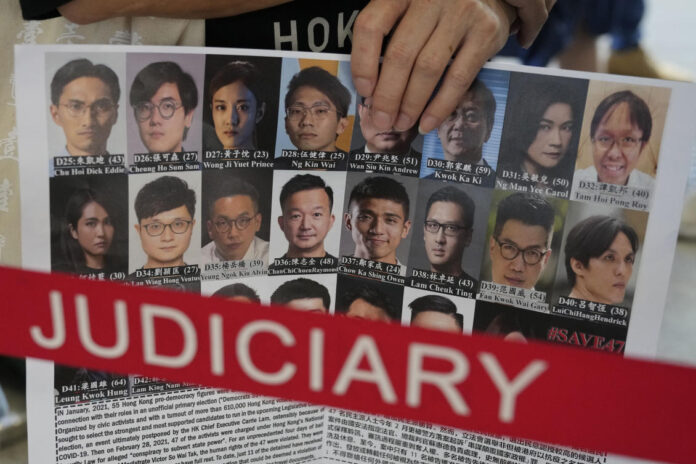HONGKONG: Hong Kong’s largest national security trial opened Monday with dozens of pro-democracy figures accused of trying to topple the government in a case critics say reflects the criminalization of dissent in the Chinese territory.The 47 defendants, who include some of the city’s most prominent activists, face up to life in prison if convicted.Sixteen have pleaded not guilty to charges of “conspiracy to commit subversion” over an unofficial primary election.The other 31 have pleaded guilty and will be sentenced after the trial.A rare, small protest erupted before the court convened, despite the large police presence.One man was seen raising his fist in solidarity.The defendants maintain they are being persecuted for routine politics, while rights groups and observers say the trial illustrates how the legal system is being used to crush what remains of the opposition.Most of the group have already spent nearly two years behind bars.They now face proceedings expected to last more than four months, overseen by judges handpicked by the government.The case is the largest to date under the national security law, which China imposed on Hong Kong after huge democracy protests in 2019 brought tear gas and police brawls onto the streets of the Asian financial hub.Wielded against students, unionists and journalists, the law has transformed the once-outspoken city.More than 100 people had queued outside the court, some overnight, hoping to see the trial begin on Monday.Chan Po-ying, a veteran campaigner and wife of defendant “Long Hair” Leung Kwok-hung, joined supporters carrying a banner that read “Crackdown is shameless” and “Immediately release all political prisoners.””This is political persecution,” she said outside the court.Inside, Leung repeated his not-guilty plea, adding: “Resisting tyranny is not a crime.”Those on trial represent a cross-section of Hong Kong’s opposition — including activists Joshua Wong and Lester Shum, professor Benny Tai and former lawmakers Claudia Mo and Au Nok-hin.Most — 34 out of 47 — have been denied bail, while the few released from custody must abide by strict conditions, including speech restrictions.Families of the accused have called these measures “social death.”The group was jointly charged in March 2021 after organizing an unofficial primary a year earlier.Their stated aim was to win a majority in the city’s legislature, which would allow them to push the protesters’ demands and potentially force the resignation of Hong Kong’s leader.According to prosecutors, this was tantamount to trying to bring down the government.”This case involves a group of activists who conspired together and with others to plan, organize and participate in seriously interfering in, disrupting or undermining (the government)… with a view to subverting the State power,” the prosecution said in its opening statement.More than 610,000 people — about one-seventh of the city’s voting population — cast ballots in the primary. Shortly afterwards, Beijing brought in a new political system that strictly vetted who could stand for office.The case has attracted international criticism, and diplomats from 12 countries including the United States, Britain, Australia and France were seen at the court Monday.”This is a retaliation against all the Hong Kongers who supported the pro-democratic camp,” Eric Lai, a fellow of Georgetown University’s Center for Asian Law, told AFP of the trial.”Beijing will go all out — even weaponizing the laws and court — to make sure democratic politics in Hong Kong cannot go beyond the lines it drew.”The trial is being heard in an open court but without a jury, a departure from the city’s common law tradition.”It is as if the national security law is now the new constitution for Hong Kong and the judges are playing their role in making sure that happens,” said Dennis Kwok, Hong Kong’s former legal sector legislator.Weeks before the hearing began, Hong Kong’s Chief Justice Andrew Cheung defended the courts against accusations of politicization.”Whilst inevitably the court’s decision may sometimes have a political impact, this does not mean the court has made a political decision,” Cheung said.

